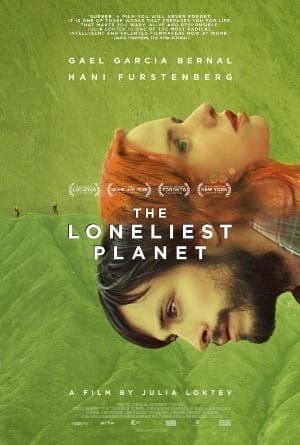Love’s work in the reel

Julia Loktev’s film The Loneliest Planet in review
In the midst of a multiplicity of choices, it is difficult to find a film these days whose images and narrative do not come with a short expiration date. For anyone who has ever been in love, The Loneliest Planet is such a film. It is haunting. By following a couple’s movements through the empty foothills of Georgia, it manages to capture that elusive spirit of love that is born out of struggle. As Bonhoeffer criticized his culture for being a society in which grace was cheap, so too, our contemporary culture is a place where love comes too easily, and perhaps not at all. Yet, in her film The Loneliest Planet, Julia Loktev portrays love not simply as a feeling but as work—an equivocal wrestling with naïveté, betrayal, self-doubt, self-hatred, and reconciliation that ends, if not joyfully, at least with a possibility of hope.
The vast expanse of the Georgian wilderness helps to bring out that relationship. In a routinely occurring wide-angled shot, accompanied by the music of a lonely cello, the camera remains motionless, taking in the stillness of the landscape as the couple and their guide move across it in isolation, the distance between each person exposes the undercurrents of their relationships. As these midrashic scenes are cut, often suddenly and with little warning, the viewer is brought back into the particular interactions between the couple. No music is heard throughout these interactions, only the monotony of footsteps.
In the beginning, this cultivates an atmosphere of wild, romantic love, sweet and innocent in its tender touches and promiscuous play. With the sweeping landscapes of lush green, an Edenic feeling hangs in the air, and while a physical distance remains between the couple throughout the midrashic scenes, one has a sense that the crossing of this distance is an invitation to adventure.
As Irenaeus argued, a Garden of Eden can only last so long; insofar as it is populated by the naïve—albeit the beautifully naïve—a fall is inevitable. What is surprising about the fall in The Loneliest Planet is the unpredictably believable way it occurs. During a rare encounter with others in the wilderness, a split-second, slight movement (perhaps even precognitive) by the male character calls into question what previously appeared as love. The movement, consciously willed or not, is a profound act of betrayal, a moment of a lover putting himself before his beloved. The ironic dilemma: If the partner of the opposite gender had committed that same movement, it is unclear whether an equivalent betrayal would have occurred.
The implications of this movement and ensuing dilemma come to dominate not only the interactions in the rest of the film but the memory of all that went before. Were those moments of testing each other’s physical strength really play, or were they a more serious competition? Perhaps what appeared to be love from the beginning was just an easy romance—a cheap love—unable to negotiate the ways in which even lovers have boundaries.
For the male character, this inaugurates a period of self-hatred. In his betrayal, he is forced to confront the limits of what he thought was limitless love, a limit in himself that he finds unforgivable. For the female character, this leads to self-doubt. Angry about the event, she is more angry with herself, for while she holds herself as a strong, liberated woman, nevertheless, a part of her strongly desires her lover to treat her with chivalry, even in its patronizing forms.
Forgiveness amidst such a flood of self-torment and relational tensions does not come easily, and this begins to be reflected in the landscape. Where the Georgian foothills once seemed green with grass, we now see a terrain of barren rocks and muddy shale. But the question remains: Has the landscape actually changed? Or is it that, in the light of betrayal, we are becoming aware that it was never really Eden to begin with? Likewise, although the midrashic scenes employ the same cello music, it comes to sound different—more lonely and despairing. The monotony of the journey continues—only now, we get the sense that the spaces between the walkers no longer offer the adventure of boundaries to be overcome, but rather the impossible limits of each person’s singularity—a singularity that seems to drain the power of love.
Or does it?
There are no easy answers or returns in The Loneliest Planet. Indeed, before the end, there is more betrayal, while attempts at reconciliation are spurned. Yet, the film does not leave us without a glimpse of hope. As the tents are packed up—a sign of the continuing journey—we see a hand busy at work. Silently, it reaches out and touches the other with a hesitant touch of tenderness: a gesture of faith. This is love’s work, and it doesn’t come cheap.



